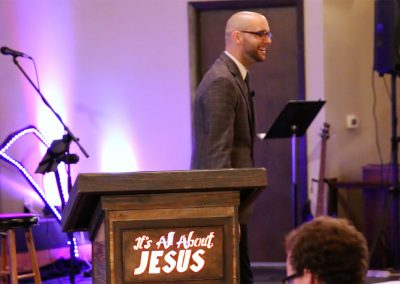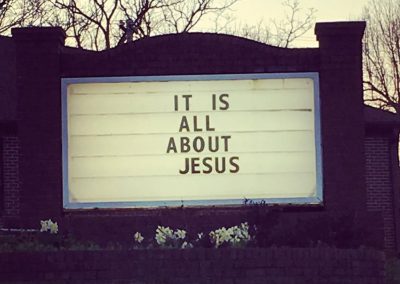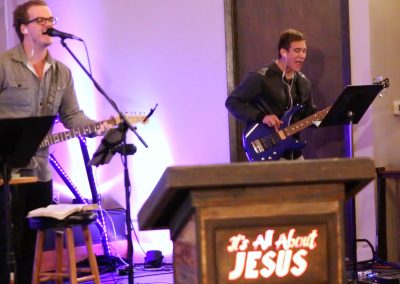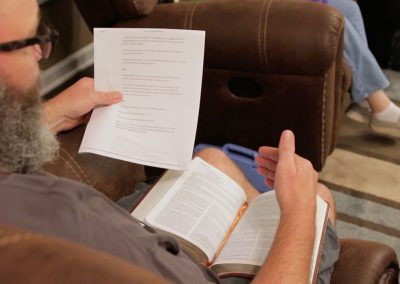Washing Hands and Feet | Week 2 | Luke 10:25-37
In Luke chapter 10 Jesus tells a lawyer that he will live if he DOES the commands he’s just recited from the law. We are all familiar with ‘you shall love the Lord your God with all of your heart, soul, mind and strength, and love your neighbor as yourself’ but what would our lives look like if we actually DID them?
Jesus goes on to tell the story of the Good Samaritan to reveal the value of compassion, love, humility and care in the Kingdom of God; and reveals to us our true place in this story.
Join us in Luke 10:25-37 as we continue our journey through our series: Washing Hands and Feet.
It’s all about Jesus.

Date: March 29, 2020
Speaker: Jason Jordan
Series: Washing Hands & Feet
Watch the archived Facebook LIVE stream by clicking the button below!
Pastor’s Comment
Thank you so much for listening in here at West Side. We often say that we love the word of God because it points us to the son of God. We hope these messages encourage you and equip you to love Jesus more. We also want you to be apart of a local church, we believe these messages are only supplemental, being apart of a local church is essential. Blessings.
Sermon Notes
Washing Hands & Feet Week 2 | Luke 10:25-37
Review> Christians in a crisis are concerned for others not consumed with themselves.
INTRO> In moments like this, when the props are kicked out from underneath us, we sort of do an inventory of our beliefs. Like, “what is this thing really all about? Why am I a Christian? How does a Christian respond in these moments?” The great thing about that is, we know the answers to those questions! You see, Christianity wasn’t birthed out of a myth, we believe that the life, death and resurrection of Jesus is historical fact! We know how early Christians respond in moments of crisis like this. Around 130 A.D. We have a piece of history known as “The Apology of Arsidies” he was an ancient greek statesmen who was fascinated by Jesus and the early Christians and the lives they lived. He writes to the Roman Emperor Hadrian, who was known for being a ruthless man. He writes to this Emperor describing what he is seeing in the lives of these so called “Christians.” “But Christians… show kindness to those near them; and whenever they are judges, they judge uprightly… they do good to their enemies… if one of them have bondsmen and bondswomen or children, through love towards them they persuade them to become Christians, and when they have done so, they call them brethren without distinction. They do not worship strange gods, and they go their way in all modesty and cheerfulness. Falsehood is not found among them; and they love one another… And he who has, gives to him who has not, without boasting. And when they see a stranger, they take him in to their own homes and rejoice over him as a very brother… And if they hear that one of their number is imprisoned or afflicted on account of the name of their Messiah, all of them anxiously minister to his necessity… And if there is any among them that is poor and needy, and they have no spare food, they fast two or three days in order to supply to the needy their lack of food… Such, O King… is their manner of life… And verily, this is a new people, and there is something divine in the midst of them.”
CONTEXT> The context of Luke 10 is all about discipleship, what it is to be a follower of Jesus. This very famous parable isn’t about morality, it’s about discipleship.
APP> 1) The Barrier 2) The Blue Print 3) The Basis
1) The barrier to discipleship. v25-29
-
-
- Do you see the scene in the text? A lawyer, putting Jesus to the test!
- The lawyer answers rightly. Which is sort of a scary thing when you think about it right? It’s a right Sunday School answer but the turn is found in v29, “desiring to justify himself.”
-
APP> Disciples of Jesus don’t justify themselves, disciples of Jesus deny themselves. “If anyone would come after me, let him deny himself and take up his cross daily and follow me.” Luke 9:23
APP> We don’t come to Jesus and negotiate who we can love.
-
-
-
- “who is my neighbor” The problem is revealed in the question. The question shouldn’t be “Who is my neighbor” but rather, “How can I neighbor”. You see, it’s a negotiation.
-
-
2) The blueprint for discipleship. v30-36
-
-
-
- Jesus then goes into the famous story, the Good Samaritan. To try and clean this story up and make non controversial completely misses the point. And neither we like it or not, the issue of race is in this text. Jesus says a priest stops by and a Levite, and they do nothing. Who is the hero of the story then? A Samaritan! (gasp)
-
-
APP> Jesus very clearly makes the connection of being a “disciple” is being a “neighbor”
APP> Neighboring is meeting needs with living deeds.
What does biblical neighboring look like?
-
- It’s emotional. v33“he saw him and had compassion on him” that word compassion is the huge greek word σπλαγχνίζομαι splagchnizomai , which literally means, “moved in the bowels” think about it like a gut feeling. Compassion is the ability to be affected by something that doesn’t affect you.
- It’s intentional. v34“he went to him..” we can’t look over this. You see, a Facebook post, wasn’t enough. He moved toward the need, with intention.
- It’s sacrificial. v34-35“bound up his wounds.. I will repay you.” Love isn’t comfortable or easy, that’s cheap grace.
3) The basis for discipleship. v33,v37
-
-
- The key to this passage is in v33, look at the Samaritans reaction and response…. sound familiar? “When he saw the crowds, he had compassion for them, because they were harassed and helpless, like sheep without a shepherd.” Matthew 9:36
- You see…. who are you and I in this story? We are the broken and dying person on the side of the road, Jesus is the great Samaritan. Jesus see’s us, has compassion on us and moves towards us.
-
Big Idea > You can love radically when you’ve been radically loved.
Close> Dr. Martin Luther King Jr was the great baptist preacher and civil rights leader. Most everyone know his famous, “I have a dream speech.” But the night before he as murdered, he spoke in Memphis TN, he spoke his very famous speech, “I’ve been to the mountain top!” There he prophetically said , “Well, I don’t know what will happen now; we’ve got some difficult days ahead. But it really doesn’t matter with me now, because I’ve been to the mountaintop. And I don’t mind. Like anybody, I would like to live a long life—longevity has its place. But I’m not concerned about that now. I just want to do God’s will.”
But do you know what his text was that evening and what he said before that? He spoke about the good Samaritan and he said that the character asked two, different questions.
The priest and the levite asked, “If I stop and help this man, what will happen to me?”
The Samaritan asked, “If I don’t stop and help this man, what will happen to him?” https://kinginstitute.stanford.edu/king-papers/documents/ive-been-mountaintop-address-delivered-bishop-charles-mason-temple
May we move forward in the days ahead not asking, “If I help people what will happen to me?! but rather, “If I don’t reach out and help these people, what will happen to them!
Kids Side Lesson
Re-tell the story in a “Mr. Rodgers” way. (Take off shoes, change shoes and change sweater)
Have band-aids, and things to put on your arm or leg while you tell the story.
Sticky Sentence: “Being a neighbor is meeting needs with loving deeds!”
Bible Memory verse for the week: “We love because he first loved us!” 1 John 4:19





